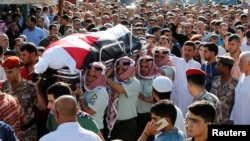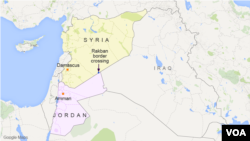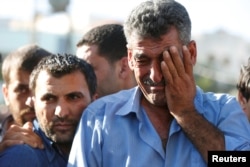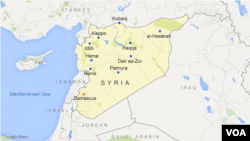The explosion of a car bomb on Syria’s border with Jordan that killed six Jordanian troops and wounded 14 other people is raising fears that violence in Syria is spreading to its neighbors.
“The frequency of attacks against or in Jordan are increasing,” said Yan St-Pierre of the Berlin-based security firm MOSECON. “That’s a sign that what everybody feared – that the conflict would start to spill over into adjacent areas – is becoming real.”
No group has claimed responsibility for Tuesday's border attack, but hours later, Jordan’s King Abdullah vowed to strike anyone who threatens Jordan or its borders “with an iron fist.”
Jordan’s government, which already hosts 600,000 registered refugees in a country of less than 6.5 million people, says it will further restrict refugees’ ability to enter and settle. The government announced Tuesday that borders with Syria and Iraq would be considered closed military zones, and that no new refugee camps will be built.
In early June, five Jordanian intelligence officers were killed in an attack on a security office near a Palestinian refugee camp near the capital, Amman.
Military outpost
The car bomb struck around 5:30 a.m. at a remote military outpost by the Syrian border.
The Rakban crossing is the only Jordan border that has recently allowed even a few Syrian refugees to cross, and tens of thousands of people are stuck on the Syrian side, hoping to escape war and extremist militant groups, including Islamic State.
Jordan’s government, which already hosts 600,000 registered refugees in a country of less than 6.5 million people, says it will further restrict refugees’ ability to enter and settle. The government announced Tuesday that borders with Syria and Iraq would be considered closed military zones, and that no new refugee camps will be built.
“The car moved at a very high speed,” a statement released by Jordan’s army said on Tuesday. “It avoided fire from troops, who reacted fast. When it reached the military outpost, the driver blew up the car in a vicious operation.”
Western coalition
The United States-led coalition fighting Islamic State militants in Syria has been largely ineffective at containing the war because it lacks ground presence, said Andreas Krieg, an assistant professor at King’s College London who also works with the Qatar Armed Forces.
By relying on local ground forces to support its aerial bombardment campaign against Islamic State militants, the U.S. is conducting “surrogate warfare,” Krieg said.
The emergence of Islamic State, he adds, is partially a result of the underfunded and undertrained "surrogates" fighting the army of President Bashar al-Assad without success.
“The influx of Jihadist forces into Syria is something that was facilitated because we had people on the ground with the feeling they wouldn't get anywhere with moderate forces,” he explains. "Because moderate forces weren't adequately supported."
And, like the 51 U.S. diplomats that last week called for greater military intervention Syria through a leaked internal memo, Krieg said he believes the U.S. needs to take a strong stance against Syrian government forces before it can expect compromise from the Assad regime at the negotiating table.
The White House and the U.S. military have given no indication they plan to follow the diplomats’ advice, having long warned of the dangers of getting mired too deep in Syria’s chaotic and complex war.
The conflict roughly pits the Syrian Army allied with Iran and Russia against a host of rebel forces allied with the West and the Gulf States. All sides, at least officially, have a mutual foe in Islamic State and the U.S.-lead coalition said it is fighting IS, not Assad.
However, critics say further U.S. involvement would escalate the conflict, dumping more weapons into the war zone.
“This is a valid criticism,” Krieg said in response. “But then you have to be constructive in this criticism and say, ‘What is the plan B?’ I don’t think we have a plan B at the moment. It’s the best of the bad options we have at the moment."
The U.S. is not likely to change courses under President Barack Obama, adds St-Pierre from MOSECON, and some politicians in Europe also insist that they are not planning a ground invasion in Syria.
“It’s a vipers' nest and they know it,” he said. “They don’t want to get involved.”








